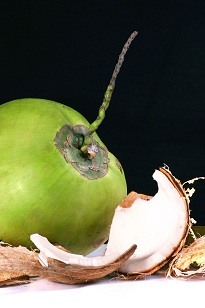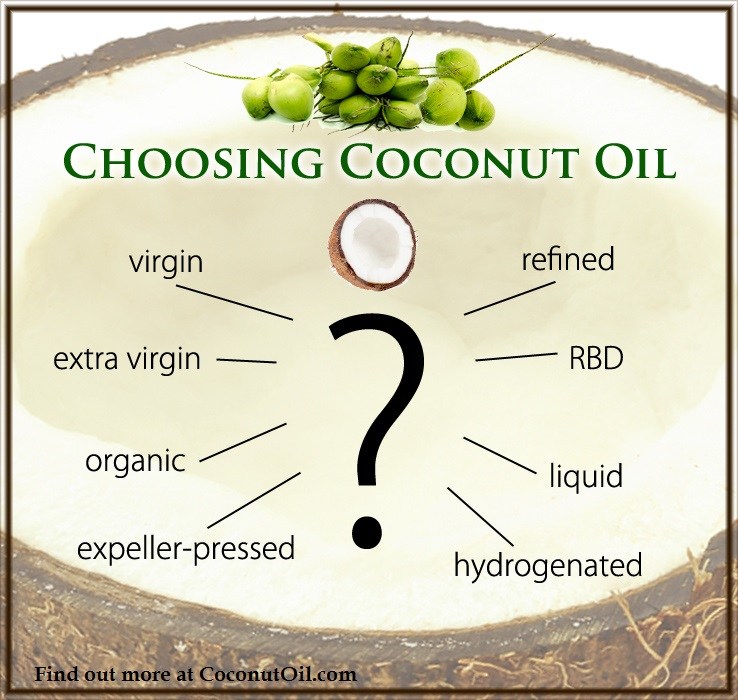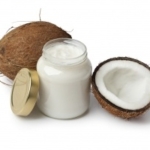by Elizabeth Goldenberg
Onespot Allergy
I follow several food blogs, and after seeing repeated mentions of coconut oil, I became interested in trying it. Tropical Traditions graciously provided me with a few jars of their product to sample, and I turned to the Onespot Allergy Facebook group for tips on how to use it. My readers know that my son is tree nut allergic, and they identified an issue – Is coconut safe for people with tree nut allergies? I knew that my son had eaten coconut before, I remembered reading that it isn’t a tree nut, but I wanted to be sure.
I searched online and found a dialogue from the Fall 2005 issue of Allergic Living magazine “Ask the Allergists” column with Dr. Wade Watson. He was asked by a mother of a peanut and tree nut allergic boy if coconut is a tree nut.
Dr. Watson’s answer was: “Coconut is a member of the palm family, which is not related to nuts or peanuts. Coconuts are large seeds adapted for water-born dispersal and remain viable after having floated in the sea for six months or more. If your son is allergic to peanuts or tree nuts, there is no reason for him to avoid coconut.” I checked with Gwen Smith, the editor of Allergic Living magazine, to see if this answer remains correct, and she assured me Dr. Watson stands by that advice.
Gwen further wrote “It’s really a seed not a nut, and most allergists don’t tell you to avoid it with tree nut allergy. The few reactions to coconut are allergy just to it, unrelated to tree nut allergy. But the FDA confused everyone a couple of years back by adding coconut to the list of tree nut allergens…if you’re tree nut allergic, ask your doctor if coconut flour is ok for you. Most with tree nut allergy do have the green light to eat coconut.”
The Food Allergy & Anaphylaxis Network (FAAN) also weighed in on this subject when asked if coconut should be avoided by someone with a tree nut allergy. The FAAN response is “Discuss this with your doctor. Coconut, the seed of a drupaceous fruit, has typically not been restricted in the diets of people with tree nut allergy. However, in October of 2006, the Food and Drug Association (FDA) began identifying coconut as a tree nut. The available medical literature contains documentation of a small number of allergic reactions to coconut; most occurred in people who were not allergic to other tree nuts. Ask your doctor if you need to avoid coconut.”
Adds my friend, Laura Waldo, author of the blog “Living Gluten and Grain Free”: ”Coconut is difficult to classify, and even botanists frequently disagree on its classification. The most accepted theory is that coconuts are classified as drupes (more specifically “dry drupes”). A drupe is a fruit with a hard stony covering enclosing the seed (like a peach or olive). While it is possible to be allergic to coconut, the cross reactivity for those with tree nut allergies is very rare. Specific tests can be used by your Allergist to determine if you or your child are allergic to coconut. To add to the confusion, the FDA classified coconut as a “nut” in 2006. The Food Allergy & Anaphylaxis Network (FAAN) does not recognize coconut as a nut. No wonder there is so much confusion when it comes to coconuts!”
As with any ingredient, watch out for “may contain nuts or tree nuts” statements on labels, which reflect cross-contamination during processing. Otherwise, coconut gets the green light for people with tree nut allergies.
Read the Full Article Here: http://blog.onespotallergy.com/2011/03/is-coconut-safe-for-people-with-tree-nut-allergies/
Virgin Coconut Oil:
How it has changed people’s lives and how it can change yours!
Includes 85 recipes – Free shipping available!







 The FDA has NOT Banned Trans Fats! Traditional Saturated Fats like Coconut Oil Continue to Shine for Alzheimer's Disease but are Condemned by U.S. Dietary Advice
The FDA has NOT Banned Trans Fats! Traditional Saturated Fats like Coconut Oil Continue to Shine for Alzheimer's Disease but are Condemned by U.S. Dietary Advice The Evidence of Coconut Oil's Superiority Over Drugs in Destroying Pathogens Continues to be Published in Peer-Reviewed Journals
The Evidence of Coconut Oil's Superiority Over Drugs in Destroying Pathogens Continues to be Published in Peer-Reviewed Journals Study: Virgin Coconut Oil Protects Neuronal Damage and Mortality after a Stroke Incidence
Study: Virgin Coconut Oil Protects Neuronal Damage and Mortality after a Stroke Incidence Another Phase 3 Trial Failure to Develop an Alzheimer's Drug Shows Why Virgin Coconut Oil is Needed to Prevent Dementia
Another Phase 3 Trial Failure to Develop an Alzheimer's Drug Shows Why Virgin Coconut Oil is Needed to Prevent Dementia FDA Food Police want to Dictate What Foods are "Healthy" in New Guidelines Criminalizing Traditional Fats Like Butter and Coconut Oil
FDA Food Police want to Dictate What Foods are "Healthy" in New Guidelines Criminalizing Traditional Fats Like Butter and Coconut Oil